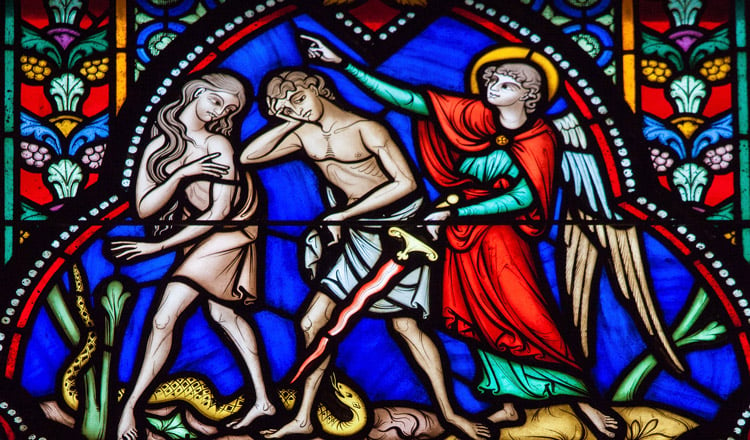2 min read
Gospel-Centered from the Start
“Let us hold unswervingly to the hope we profess, for He Who promised is faithful…Jesus Christ is the same yesterday, today, and forever.” (Hebrews...
Sermon preached on Sunday, October 4, 2020 by Reverend Claire Strunk at Communitas, Spokane.

When I was 9, my family would swim at the YWCA. One night we were there for open swim, and my mom’s friend was also there, swimming with her tiny baby. I was good at holding babies, and good at swimming, so I thought it would be fun to hold this baby in the water.
I asked to hold the baby. You know what happened? While I was holding the baby, it squirmed and slipped right out of my hands and sunk under the water. The mom was right there watching, so she quickly scooped up her baby and the baby was fine, but it started to cry because it was a little scared from being underwater and I could tell the mom was scared too. I felt SO bad. There was a terrible pit in my stomach. I knew the baby was fine, but I was sure this mom did not like me anymore because I dropped her baby. So you know what I did? I swam to the opposite end of the pool and tried to hide in the corner behind a ladder because I didn’t feel like I belonged with our friends any more. I don’t even remember who that woman is anymore, but that experience has stuck with me and it still makes me feel full of shame.
When I was 16, I was working as a lifeguard at Comstock pool. It was my first job and I was so excited. It was going to be the best job because I was working with a bunch of my friends and working at a pool means you can swim whenever you want. It was awesome. A few weeks after I started, the lifeguard manager gave me what is called a blue-cap test. She put a dark blue swim cap on the head of one of the kids who was swimming and she told that kid to pretend to drown. I was supposed to notice him within 25 seconds and practice saving him. But there were a lot of kids swimming that day, and I didn’t see the one who was pretending to drown. One of the other lifeguards blew her whistle and immediately I saw the blue cap and knew I had messed up. I felt terrible. What if it hadn’t been a drill and that kid was really drowning? I was sent home from work early. I went to my bedroom which was in the corner of our basement and I hid. I was afraid none of the other lifeguards would like me anymore. I was afraid they wouldn’t want me to work there anymore.
I could tell many more stories like this. I mean, these are just my shame stories that happened in swimming pools!
Truth is, every single person has stories where they felt that terrible feeling too.

Researcher Dr. Brene Brown has studied shame for over twenty years. She says this:
“The conclusion I’ve drawn from my research is this: When we experience shame, we respond to it with our entire being. It effects the way we feel, think and act; and often we have a strong physical response to shame. In other words, shame is a core emotion—it strikes us at our center and radiates through every part of us.”
That is why this is such an important emotion for us to consider—because it is so universal, and because it affects our entire being, the way we feel, think and act.
We see shame creep up from the very beginning of the biblical narrative.
Everything starts out so good, so pure and beautiful. We read in Gen. 2:25 that Adam and Eve are naked and they felt no shame. They are then approached by the Evil One, in the form of a serpent who convinces them to eat from the tree that God told them not to eat from. They eat the forbidden fruit and everything starts to unravel. They realize they are naked and the text implies that they feel shame because they try to sew leaves together to cover their nakedness, their vulnerability. When they hear God in the garden, they hide. Interestingly, God doesn’t start shaming them, or yelling at them, or lecturing them, or giving them the cold shoulder. God asks, "Where are you?" Think about that. God knows what has happened and God still wants to walk with them in the garden, God wants to be with them because of who they are—worthy of belonging.
The shame is too heavy to bear and so Adam blames Eve to deflect some of the burden. Eve blames the serpent. God responds by giving some consequences, but also by sewing clothes for them which is such a beautiful picture of grace and compassion.
This is what I want us to see from Adam and Eve’s story: The shame they experienced 1) cut off connection with God because their impulse was to hide, 2) cut off connection with one another as they move to blame, and 3) it cut off connection within their own souls, in what psychologists call disintegration. Disintegration disconnects thinking from feeling from sensing.
Shame within us makes everything a total wreck inside. Shame makes it hard to be creative, hard to think clearly. Shame disintegrates the different aspects within us that make us who we are. It is isolating in every way.
Mostly shame makes us want to turn away. And as we turn away, the message we begin to hear is not that we HAVE messed up, but that we ARE messed up. It is no longer that we have done something bad, but that at our core we ARE bad.

So what do we do? Trying to hide our shame actually acts like a noose. The more we hide it, try to pretend it is not there, the tighter the rope gets. If our unchecked shame takes over, we end up wrecking our relationships because of things we say or destructive things we do.
And it is in that place of hiding and isolation that God says, "Where are you?" God comes TO YOU because God longs to walk beside you. God already knows what you are hiding, why you are hiding, and he invites us to bring our shame to him to begin the process of being reconciled: 1) reconnected to God, 2) reconnected to one another and 3) to experience the peace of integration in our own souls.
This is the good news: God gives us some tools to help us know how to deal with our shame. Each of these tools correlates with the disconnection we experience through shame.
1) Honest prayer—This tool helps reconnect us to God.
God encourages us to take our emotions (every emotion) to him in prayer. We have been studying the Psalms because the Psalms are deeply emotional prayers. Now, you may be someone for whom writing songs or prayers to God comes really naturally. I’m not wired that way. But when I am praying as a way to process my emotions, I find it is helpful for me to write some statements down on paper. Here’s an example. There is a woman who was a very close friend of mine several years ago. She moved abroad so we lost touch for a few years, but then recently she moved back to the states and I was excited to reconnect. I kept calling and texting her, but she never returned my call. Then I would see her post all these pictures on social media where she was doing things with other new friends. I’ll be honest: I was really sad. So I wrote down: God I’m sad and angry that she hasn’t returned my call. Shame was creeping in. It was telling me that I wasn’t a good enough friend for her to make time to call me back. I started to believe that everyone else who is currently in my life is going to find out that I am not worthy to be their friend, and all of a sudden, I would have no friends. When I took this painful experience to God in prayer, the Holy Spirit asked me to think about and write down all the people who are currently good friends to me. I realized I have so many friends who reach out to me and care for me! The shame started to dissolve.

2) Next, begin to tell yourself a new story—This tool helps us experience reconciliation and peace within ourselves.
You know, it’s not actually the big traumatic events that have the strongest effect on us when we are dealing with shame. It is the multiple times a day when we tell ourselves stories like these: I should have done this, I shouldn’t have said that. I’m so stupid. I’m so ugly. I’ll never be able to change this terrible behavior. BUT God is a great storyteller and we are created in his image, so we too are story tellers. God invites us to remember we are a part of his story. He has created us to play a meaningful part in seeing his kingdom come on Earth as it is in Heaven. And so we can start writing shame out of the narrative. In the story about my friend who didn’t call me, I believed the story that she didn’t call because I’m not a good enough friend. But I tell myself a different story: God says I am enough. God has affirmed that I am lovable. This puts me back in God’s story and it really does bring peace.
3) The third tool helps restore connection with others—Begin to invite safe people into your shame.
Dr. Brene Brown says, "Shame derives its power from being unspeakable… If we cultivate enough awareness about shame, to name it and speak to it, we’ve basically cut it off at the knees. [And] if we can share our story with someone who responds with empathy and understanding, shame can’t survive."
Sometimes to get the rooted shame to become unrooted in our hearts and minds, we need to hear someone say to us that the thought patterns we are stuck in are simply lies. This made me think of the movie from the late 90s called Good Will Hunting. In this movie, you have Will (played by Matt Damon) who is in his 20s and had been in and out of the foster care system and suffered years of awful physical and mental abuse. He gets connected to this therapist named Sean (played by Robin Williams). Sean is looking at this thick file of all these graphic photos of the abuse that Will has suffered, and he begins to tell Will that it is not his fault. Immediately, Will just says, “Yeah, I know.” And friends, I’ve got to tell you right now that you will be tempted to leave here today saying the same thing: Yeah, I get that shame isn’t my fault. But that response—a conscious or unconscious refusal to really engage the shame—just allows the shame to keep growing, to become more and more powerful. Sean the counselor knows that and so he keeps repeating:
It’s not your fault.
It’s not your fault.
It’s not your fault.
And it gets awkward and we want to turn away, but then Will breaks down in tears because the truth is Will did think the abuse was somehow his fault—that he was so fundamentally flawed that this abuse was his fault. And he so desperately needed to hear someone say, "No, it’s not your fault."
Some of you have shame because of something that was done to you and you need to hear that it is not your fault. Others, like me, have shame because of something you did. Like Adam and Eve, you screwed up. You need to hear that whatever you did, it does not define you. You are worthy of love and belonging. I don’t care what it is you did—if it was big or small, if you did it one time or 1,000 times—you are worthy of love and belonging.
Now, as you are considering who you might let into your shame, it might be a good idea to start with stories that are more in the line of dropping a baby in a swimming pool when you are 9. Start with the shame stories that are the easiest to share and then as it becomes more normal to talk about shame, you can work up to telling more recent or more intense shame experiences.
This is what I know to be absolutely true—
God wants to walk with you. God knew Satan was going to do everything in his power to cut us off from God and one another, and so God decided from the very beginning to send his son. Jesus understood shame. He withstood the shame of the cross. For three days Jesus was completely cut off (he cried out that God had forsaken him), he took on all of our shame and he rose from the dead, victorious. Because of Jesus we have the power to break out of the stronghold of shame, AND to break our brothers and sisters out of that stronghold.
Because of Jesus, we can recognize our worth as God’s image-bearers and use our gifts to join God in his restorative work going on in our world. Amen.

2 min read
“Let us hold unswervingly to the hope we profess, for He Who promised is faithful…Jesus Christ is the same yesterday, today, and forever.” (Hebrews...

9 min read
To celebrate 75 years of serving the Inland Northwest, we are spending the year remembering our history and the faithfulness that built us and...

2 min read
In 2026, Union Gospel Mission Inland Northwest is approaching our 75th Anniversary! This is a milestone that invites gratitude and reflection, and...

In "The Reason Why," the author gave a description, through her story, of why she believes many women get involved in unhealthy relationships or turn...

Sin. Talk about a conversation stopper. I’m not sure anyone is anxious to talk about sin, even Christians, but in society at large, it’s almost...

An Easter season reflection by former UGM staff writer, Merrily Brast.